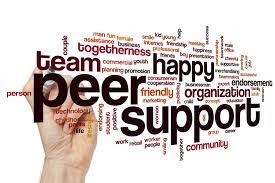Addiction recovery is a complex journey that requires life-long support. One of the most powerful tools in the recovery process is peer support, which can come in many forms. These methods of support provide individuals in recovery with a sense of community, understanding, and encouragement. This can be crucial for maintaining sobriety. Let’s delve into the power of peer support in addiction recovery. We’ll also discuss how treatment providers can develop or enhance their programs to foster strong communities of support.

Understanding Peer Support
Peer support in addiction recovery occurs when individuals who have battled addiction offer support and guidance to others facing similar challenges. This support is based on the belief that those who have experienced similar struggles can offer unique empathy, understanding, and actionable advice to aid others in their recovery journey. Peer support can take many forms, including:
- Group Therapy: Group therapy sessions led by a trained facilitator can provide a safe space for individuals in recovery to share their experiences, receive feedback, and offer support to one another.
- Peer-Led Support Groups: Peer-led support groups, such as Alcoholics Anonymous (AA) or Narcotics Anonymous (NA), provide a structured environment for individuals to share their stories, receive support, and work through the 12-step program.
- One-on-One Peer Mentoring: One-on-one peer mentoring involves a more personal relationship between a mentor who has successfully navigated the recovery process and a mentee who is currently in recovery. This relationship can provide individualized support, encouragement, and accountability.
- Explore Peer Support Information and Tools: https://www.samhsa.gov/brss-tacs/recovery-support-tools/peers.
The Benefits of Peer Support
Research has shown that peer support can have a significant impact on addiction recovery outcomes. According to a study published in the Journal of Substance Abuse Treatment, individuals who participated in peer-led support groups were more likely to abstain from substance use. It also reported higher levels of self-efficacy and social support compared to those who did not participate. Peer support can also help individuals develop coping skills, improve their self-esteem, and reduce feelings of isolation and loneliness.

Incorporating Peer Support into Treatment Programs
Treatment providers can implement peer support in their programs in a variety of ways. Some strategies include:
- Peer Support Specialists: Hiring peer support specialists who have experience with addiction can provide clients with valuable insights and support. These specialists can work alongside other treatment providers to offer a holistic approach to recovery.
- Peer-Led Support Groups: Encouraging clients to participate in peer-led support groups, such as AA or NA, can provide them with a supportive community of individuals who understand their struggles.
- Group Therapy: Incorporating group therapy sessions into treatment programs can provide clients with a safe space to share their experiences, receive feedback, and offer support to one another.
- One-on-One Peer Mentoring: Pairing clients with a peer mentor who has successfully navigated the recovery process can provide them with individualized support, encouragement, and accountability.
- Implementing EHR Practice Management Software: Using software designed to manage group sessions.
Building Strong Communities of Support
Peer support is not just about providing practical advice or coping strategies; it is also about building strong communities of support. By fostering a sense of community among individuals in recovery, treatment providers can create a supportive environment that encourages ongoing recovery, establishes camaraderie, avoids isolation, and reduces the risk of relapse. Some ways to build strong communities of support include:
- Encouraging Peer Connections: Encouraging clients to connect with one another outside of formal treatment settings can help foster a sense of community and support.
- Organizing Social Events: Organizing social events, such as group outings or volunteer activities, can provide clients with an opportunity to connect with others in recovery in a more relaxed setting.
- Providing Ongoing Support: Offering ongoing support, such as follow-up phone calls or check-in meetings, can help clients feel supported and connected even after they have completed formal treatment.
Peer support plays a crucial role in addiction recovery by providing individuals with a sense of community, understanding, and encouragement. Providers can incorporate peer support into their programs in a variety of ways to enhance the recovery process for their clients. By building strong communities of support, treatment providers can help individuals manage their conditions successfully, sustain long-term recovery, and lead full lives in our communities.
